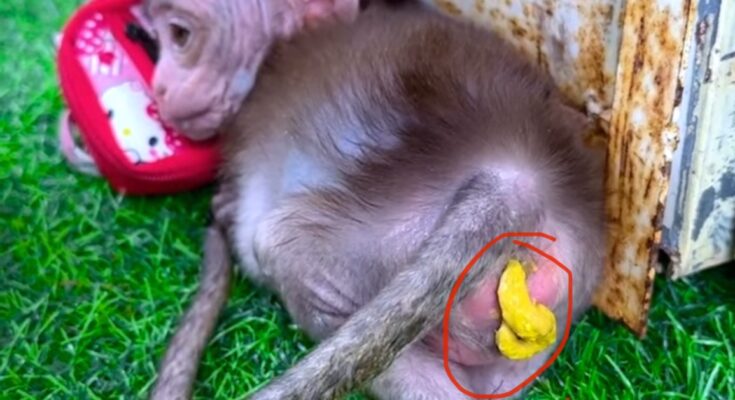Caring for a baby monkey is a delicate responsibility, and even small health issues can turn serious quickly. One of the most common and potentially dangerous conditions in infant primates is diarrhea. While it may seem minor at first, diarrhea can lead to dehydration, nutrient loss, and weakness within a short period of time. Understanding what to do—and what not to do—is essential for keeping the young monkey safe and healthy.
1. Assess the Severity Immediately
The first step is to observe the frequency and appearance of the diarrhea. Very watery stool, repeated bowel movements within a short time, or stool containing mucus or blood are red flags. Also pay attention to behavioral changes: Is the monkey unusually tired, clinging more than usual, or refusing food? These early signs help determine how urgently you need professional help.
2. Prevent Dehydration Right Away
Baby monkeys dehydrate quickly, so replacing lost fluids is crucial. Provide clean, fresh water and, if appropriate for the species, a diluted oral rehydration solution. Never give human medications or home remedies, as primates have different physiological needs and may react badly. Keeping the baby hydrated until you can reach a veterinarian is often the most important immediate action.
3. Check the Diet for Possible Causes
Dietary mistakes are one of the most common triggers for diarrhea. Baby monkeys require species-appropriate milk formulas and foods. Sudden diet changes, spoiled fruits, overly sugary treats, or unfamiliar foods may upset their digestive system. Review everything the monkey ate in the past 24 hours. Remove any questionable items and return to a simple, veterinarian-approved diet until the condition stabilizes.
4. Maintain a Clean Environment
A dirty enclosure can worsen the condition and introduce harmful bacteria. Clean the sleeping area, feeding bowls, and any toys with animal-safe disinfectants. Ensure the cage is dry and warm—cold, damp conditions make diarrhea worse and lower the baby’s immunity. Cleanliness not only prevents reinfection but also makes it easier to monitor stool changes.
5. Observe for Parasites or Infections
Parasites, bacterial infections, and viruses frequently cause diarrhea in young primates. Even if you cannot diagnose the exact cause, take note of symptoms such as:
-
Bloating
-
Persistent vomiting
-
Extremely foul-smelling stool
-
Rapid weight loss
These signs often indicate a deeper issue that only a qualified exotic-animal veterinarian can address. Never attempt to treat suspected infections with over-the-counter products.
6. Seek Veterinary Care Promptly
While mild dietary diarrhea may resolve, any diarrhea lasting more than 24 hours—especially in a baby monkey—requires professional treatment. Exotic animal veterinarians can perform stool tests, prescribe safe medications, and guide you on proper feeding and hydration. Early intervention can prevent complications such as severe dehydration or organ stress.
7. Focus on Prevention Going Forward
Once the monkey recovers, establish routines that reduce the risk of recurrence. Use only vet-approved formulas, introduce new foods gradually, and maintain strict enclosure hygiene. Keep the monkey away from sick animals and avoid overcrowded environments that increase exposure to pathogens.
Caring for a baby monkey is a rewarding yet demanding responsibility. When diarrhea occurs, swift action, proper hydration, and professional guidance are key. By responding quickly and maintaining good care practices, you can help ensure the young monkey recovers safely and stays healthy in the long term.



